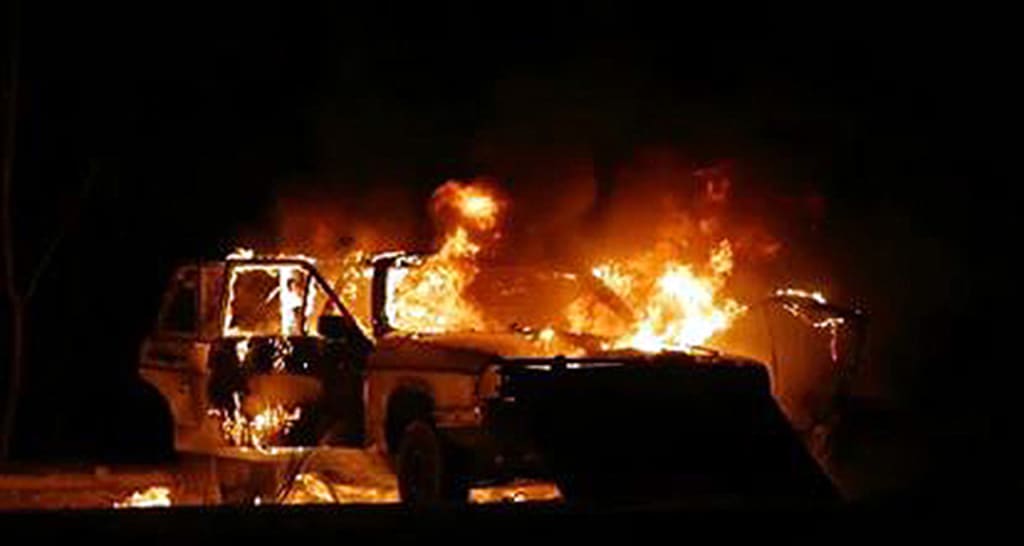What To Do (And NOT To Do) If A Bomb Goes Off
These Do's And Do Not's May Just Save A Life

While many parts of the world, throughout different eras of history, have had to worry about terrorist attacks to some degree or another (it is said that this was one of the reasons for the Crusades), it is within the last 25 years or so that the problem has reached proportions where it seems that an attack could come at any moment at any place regardless of where on Earth they may find themselves.
Things like bomb explosions and car detonations are, sadly, not just something that happens "over there" at some distant land that has been at war for centuries.
Rather, such a horror could happen on any block, in any mall, at any concert, etc, etc.
With that being true, the answer isn't to live life closed away in fear, quivering every time that a firecracker goes off, shuddering if a car backfires, or being afraid to enjoy one's existence. The answer isn't to allow those who spread terror to win by forcing everyone to live in the terror with which they wish to blanket the whole world.
Then again, to wisely combat fear, one needs knowledge.
So what should a person do if they are unlucky enough to be in the an area where an actual explosion, bomb, or like attack has taken place? Well to begin with...
D O N O T T O U C H O N E' S O W N E Y E' S ! ! !
This one golden command is perhaps the single most vital thing that a person can do in the event of an attack and one of the hardest to heed, particularly in the event that explosion has dispersed agents which burn or itch the eyes. The common human instinct is to put the hands to the eyes in such a situation but in this case, such an intrinsic can be the difference between sickness and recovery, life and death.
This is because if the explosion is nuclear, chemical, or otherwise is dispersing harmful agents, many times, those agents do not cause the sort of damage on the skin that they do once entering the body via the eyes, nose, mouth, or through other means. It is IMPORTANT to note that many chemicals - as well as often cancer-inducing nuclear agents -once they have entered the body, can NEVER be removed. Therefore, again, DO NOT TOUCH ONE'S OWN EYES IN THE EVENT OF AN EXPLOSION!
This also means to not drink, eat, nor otherwise ingest anything for any reason (even to dull what may be substantial post-explosion pain) until cleared to do so by a medical professional, even if the incident took place a distance from where one may have been at the time of the attack. The importance of this can not be overstated.
Should the explosion produce a flash, a cloud, or should any time be given to prepare for shockwaves and toxins carried on the air (along with heat), finding a wall to crouch behind, a ditch to lie in, or finding any shelter of any kind can do a lot to absorb many of the toxins carried in the blast.
Also, of course, this works to limit a person's exposure to flying glass, metal, shrapnel, and other debris.
If debris does enter the body, it is almost always best to NOT remove whatever it is. This is because doing so will not only likely cause a great deal of pain - often worse by far than when it entered the body - but the debris may be lodged in a position that, if removed, could cause a massive bleed out and death. Many people who would have otherwise made full recoveries have met their woeful ends by overlooking this wise advice, both on the battlefield and elsewhere.
Furthermore, unless the situation simply demands otherwise (such as the victim is face down in water), it is never wise to move someone who has been felled by an explosion (or virtually any injury, for that matter). This is because it is possible that a neck or spinal cord injury could be in play and moving the victim without training could cause further damage and pain, perhaps even paralysis.
It is also important for a victim to not allow anyone to needlessly move them, either, in such a situation. People may rush to one's aid and, knowing no better, cause lifelong damage just by trying to help.
Even if the feeling seems to be lost or limited in the extremities, oftentimes, these injuries do not mean that a permanent state of paralysis is a certainty. It is not uncommon, at all, for the feeling(s) to return once proper medical attention has been given to an UNMOVED victim.
If the explosion is found to be a nuclear attack of some kind (which can also be accomplished without a mushroom cloud if a dirty bomb - a "regular" bomb mixed with nuclear poisons but which do not fission), determining which nuclear poisons were used as rapidly as possible is desirable, as well as what finding out the levels of the nuclear threats were/are present.
That said, there are a few "almost certainties" that a person will want to do if the attack was thought to be involving nuclear elements. While only a doctor can be sure that any given treatment will be useful for any given person in any possible situation, bentonite clay is famous for being able to take at least some nuclear elements and clear them from the body. The clay also is thought to "hold" the elements in the body until expelled, thus preventing them from peppering their damage down the bodies intestines on the way out.
Having proper calcium levels will prevent some other nuclear elements which mimic calcium from being uptaken by the body since the body can confuse deadly Strontium-90 with healthy calcium. If that happens, it can lead to bone and other cancers. Likewise, Potassium Iodide may also be helpful for similar reasons as it relates to the thyroid.
Concerning the moments after an explosion, it is important to remember that another human instinct also needs to be met with a bit of caution: the need to help those injured. Sadly, those who set such bombings up often do so in the vilest and most nefarious ways in order to ensure the maximum number of injured and dead.
In this case, it is not unusual, for example, to have a car bomb explode on a busy street or a marketplace and, as those who rush to help the injured nearby (or who just to see what the commotion is) get close, they are met with an often bigger detonation. The second bomb is designed purposefully for this reason, too, so be aware of it should the horror ever arise.
While there are a myriad of other things which can and should be known about how to react in the event of a terror attack of some kind, if nothing else, these basics will see a person through a lot of hardships and therefore, should be called to mind often and then...
Life should be lived! Living in fear is not living and being armed with a few simple facts, such as these, can make a lot of that fear vanish, replaced by logic and the art of preparation.






Comments
There are no comments for this story
Be the first to respond and start the conversation.